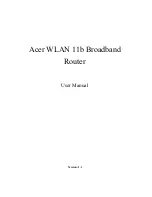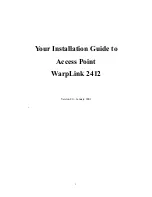
User’s Guide
Glossary
machines, modems, etc. to a telephone port. It is a 6-pin
connector usually containing four wires.
RJ-45
Registered Jack Standard-45
The 8-pin plug used in transmitting data over phone lines.
Ethernet cabling usually uses this type of connector.
routing
Forwarding data between your network and the Internet on
the most efficient route, based on the data’s destination IP
address and current network conditions. A device that
performs routing is called a Router.
SDNS
Secondary Domain Name System (server)
A DNS server that can be used if the primary DSN server is
not available.
See DNS
.
subnet
A subnet is a portion of a network. The subnet is
distinguished from the larger network by a
subnet mask
that
selects some of the computers of the network and excludes
all others. The subnet's computers remain physically
connected to the rest of the parent network, but they are
treated as though they were on a separate network. See
network mask
.
subnet mask
A mask that defines a subnet. See
network mask
.
TCP
See
TCP/IP
.
TCP/IP
Transmission Control Protocol/Internet Protocol
The basic protocols used on the Internet. TCP is responsible
for dividing data up into packets for delivery and
reassembling them at the destination, while IP is responsible
for delivering the packets from source to destination. When
TCP and IP are bundled with higher-level applications such
as HTTP, FTP, Telnet, etc., TCP/IP refers to this whole suite
of protocols.
Telnet
An interactive, character-based program used to access a
remote computer. While HTTP (the web protocol) and FTP
only allow you to download files from a remote computer,
Telnet allows you to log into and use a computer from a
remote location.
TFTP
Trivial File Transfer Protocol
A protocol for file transfers, TFTP is easier to use than File
Transfer Protocol (FTP) but not as capable or secure.
TKIP
Temporal Key Integrity Protocol (TKIP) provides WPA with a
data encryption function. It ensures that a unique master key is
generated for each packet, supports message integrity and
sequencing rules and supports re-keying mechanisms.
triggers
Triggers are used to deal with application protocols that create
separate sessions. Some applications, such as NetMeeting,
open secondary connections during normal operations, for
example, a connection to a server is established using one port,
but data transfers are performed on a separate connection. A
trigger tells the device to expect these secondary sessions and
how to handle them.
Once you set a trigger, the embedded IP address of each
incoming packet is replaced by the correct host address so that
NAT can translate packets to the correct destination. You can
specify whether you want to carry out address replacement, and
if so, whether to replace addresses on TCP packets only, UDP
packets only, or both.
209
Summary of Contents for DA-150N
Page 1: ...Wireless ADSL2 Router User s Guide WELL DA 150N Wireless ADSL2 Router User s Manual 1...
Page 15: ...Wireless ADSL2 Router User s Guide Figure3 RESET button 15...
Page 22: ...Wireless ADSL2 Router User s Guide 4 Double click on Internet Protocol Version 4 TCP IPv4 22...
Page 33: ...Wireless ADSL2 Router User s Guide Figure 1 Homepage 33...
Page 41: ...Wireless ADSL2 Router User s Guide 41...
Page 58: ...User s Guide Configuring your Computers 58...
Page 79: ...User s Guide Configuring your Computers 79...
Page 95: ...User s Guide Configuring your Computers 11 Enter AP s Self PIN Number and click next 95...
Page 97: ...User s Guide Configuring your Computers 13 Enter the Passphrase and then click Next 97...
Page 136: ...User s Guide Configuring your Computers 136...



































